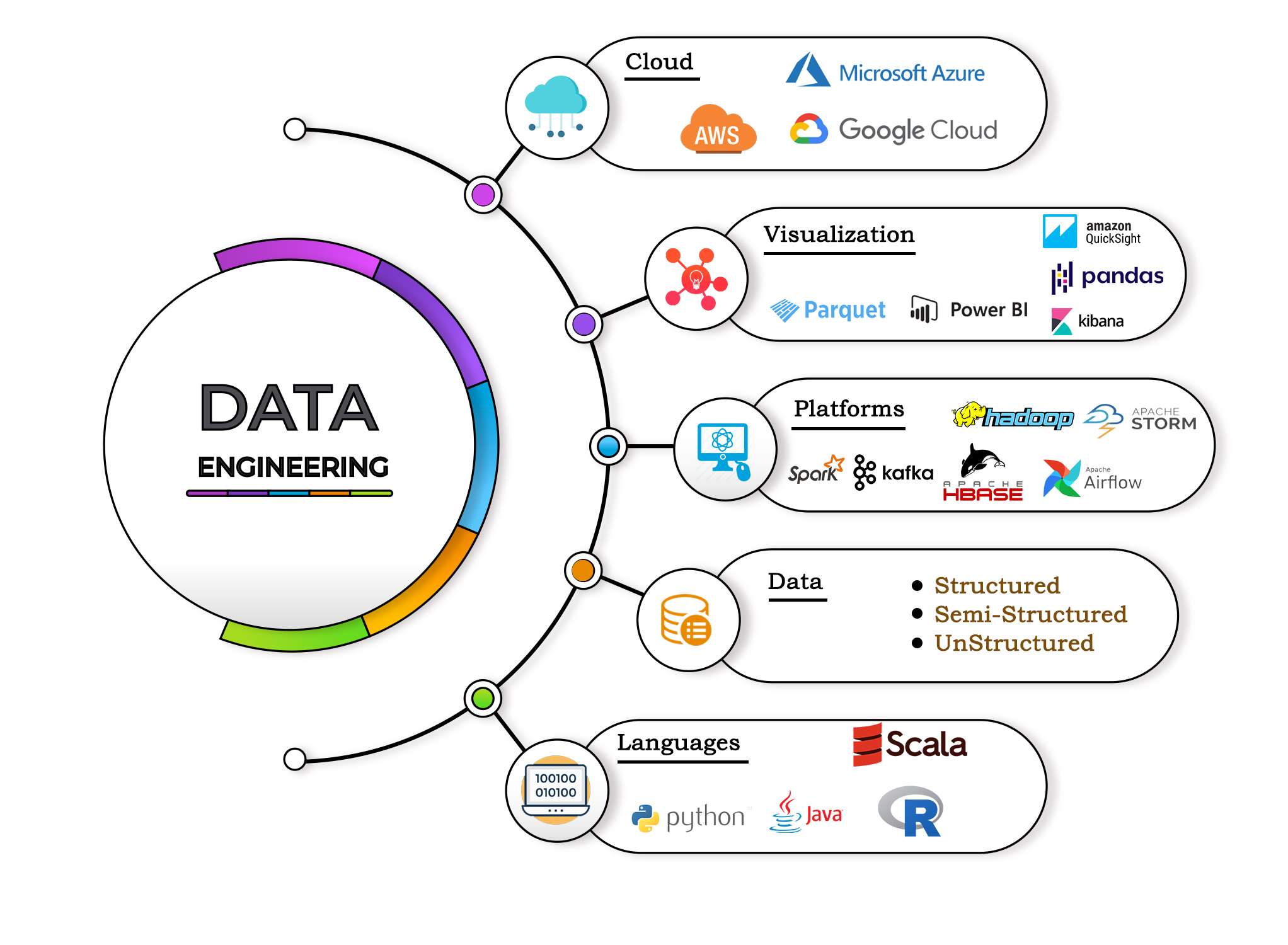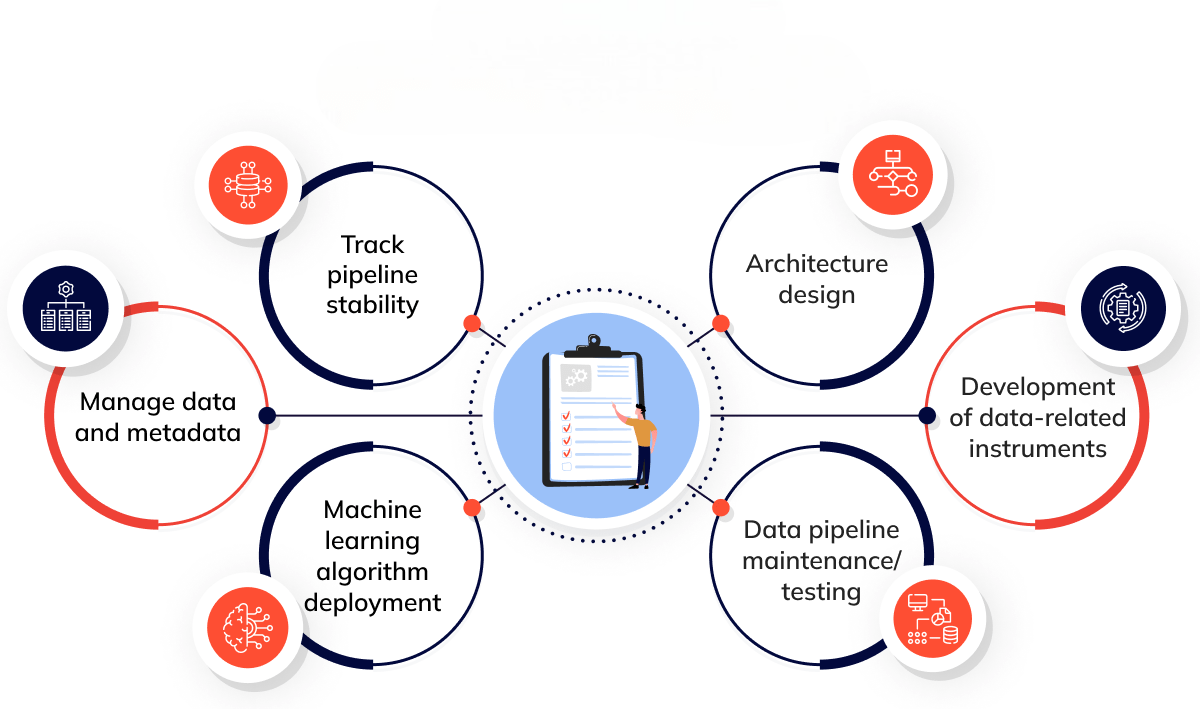
- Introduction to Data Engineer Salary Trends
- Factors Affecting Data Engineer Salaries
- Data Engineer Salary by Experience Level
- Salary Comparison by Location
- Data Engineer Salary in Different Industries
- Average Salary for Entry-Level Data Engineers
- Senior Data Engineer Salary Range
- Highest-Paying Companies for Data Engineers
- Certifications That Boost Salary
- Skills That Influence Data Engineer Salaries
- Salary Trends in 2025 and Beyond
- Tips to Increase Your Data Engineer Salary
Introduction to Data Engineer Salary Trends
The demand for data engineering professionals has surged significantly as organizations increasingly rely on data for business intelligence, machine learning, and advanced analytics. With companies across various sectors focusing on data-driven decision-making, data engineers are crucial in creating and maintaining the infrastructure needed for efficient data storage, access, and analysis. Understanding salary trends for data engineers is vital for both hiring managers and job seekers aiming to stay competitive in today’s dynamic job market. These professionals manage extensive datasets, designing and implementing systems to collect, organize, and transform raw data into structured formats that are ready for analysis. They ensure the integrity and efficiency of data pipelines, making sure data flows seamlessly from its source to its destination. Collaboration is central to their role, as they often work closely with data scientists, analysts, and IT teams to develop strong data-processing architectures. As the role of data engineers continues to evolve, those interested in enhancing their expertise might consider opportunities for growth, such as Data Science Training which can help professionals expand their skill set and stay ahead of industry trends. Due to their vital role in the data ecosystem, data engineers’ compensation reflects their technical skills and the impact they have on business outcomes. This article delves into the factors that influence data engineer salaries, offering insights into compensation trends based on experience, location, industry, and organizational type. Additionally, it provides guidance on how professionals can enhance their marketability and boost their earning potential through skill development, certification, and strategic career moves.
Would You Like to Know More About Data Science? Sign Up For Our Data Science Course Training Now!
Factors Affecting Data Engineer Salaries
Several factors contribute to the salary variations in the data engineering field. These factors include experience, skills, education, certifications, industry, and location. Let’s explore them in more detail:
- Experience: A data engineer’s experience is one of the most important determinants of their salary. Entry-level engineers typically earn lower salaries than their more experienced counterparts, while senior-level engineers are compensated significantly higher for their expertise in designing complex data architectures and leading teams.
- Education: Having a strong educational background, such as a degree in computer science, engineering, or mathematics, can have a positive impact on salary levels. Advanced degrees, such as a Master’s or PhD, are often associated with higher-paying roles, although they are not always required.
- Certifications: Data engineers with specialized certifications, such as those in cloud technologies (AWS, Azure, Google Cloud), or specific tools (Hadoop, Spark), can command higher salaries due to their technical expertise. These certifications often demonstrate a commitment to staying updated with the latest trends in data management technologies.
- Industry: Data engineers working in industries such as finance, technology, and healthcare often enjoy higher salaries than those working in other sectors. Companies in these industries are known for offering lucrative compensation packages to attract top talent due to the critical role data plays in their operations. If you’re looking to excel in these high-paying sectors, you might consider taking steps to Learn Data Science which can further enhance your expertise and marketability in the data engineering field.
- Location: Geographic location plays a significant role in salary differences. Data engineers working in tech hubs like San Francisco, New York, or London typically earn higher salaries compared to those in smaller cities or regions with a lower cost of living.
- Skills: Specific technical skills, such as proficiency in SQL, Python, Hadoop, Apache Spark, and cloud-based technologies, directly impact a data engineer’s earning potential. As the demand for big data and machine learning increases, data engineers with experience in these areas can command higher salaries.

Data Engineer Salary by Experience Level
The salary of a data engineer is heavily influenced by their level of experience, with earnings generally increasing as they advance in their careers. Entry-level data engineers, usually with less than two years of experience and often recent graduates or individuals transitioning into the field, typically earn between $70,000 and $90,000 annually, though this can vary based on company and geographic location. Their responsibilities often include supporting the construction of data pipelines, cleaning data, and gaining proficiency in the team’s technical tools. As these engineers acquire practical experience, their compensation tends to rise considerably. Moving into the mid-level category, which encompasses professionals with two to five years of experience, salaries generally range from $100,000 to $120,000 per year. These engineers handle more advanced tasks such as optimizing data pipelines, managing larger datasets, and deploying data warehousing solutions. At this stage, they are expected to be well-versed in essential technologies like SQL, Hadoop, and cloud platforms, and may begin mentoring junior engineers or assuming leadership responsibilities. In addition, gaining proficiency in Data Engineering Tools becomes increasingly important for advancing to these levels. Senior data engineers, with five or more years of experience, carry significant weight within organizations and are tasked with designing complex data architectures, leading teams, and collaborating closely with data scientists and business units. Their salaries typically fall between $130,000 and $160,000, with some exceeding $180,000 depending on the employer and location. These professionals are expected to have comprehensive expertise in diverse technologies and to contribute to strategic decisions related to data management, security, and system scalability. At the top of the hierarchy are lead or principal data engineers, who generally have over eight years of experience and oversee entire data engineering teams or departments. These roles command salaries ranging from $160,000 to $200,000 annually. Their responsibilities are critical, involving not only the technical execution of large-scale data strategies but also providing visionary leadership and setting the architectural direction for data infrastructure across the organization.
Salary Comparison by Location
Location is a key factor influencing salary trends in data engineering. Major tech hubs and cities with high living costs tend to offer higher salaries to attract top talent. Here are a few examples of salary variations by location:
-
San Francisco Bay Area, CA:
- San Francisco is home to numerous tech giants, including Google, Apple, and Facebook, making it one of the highest-paying regions for data engineers. The average salary for a data engineer in San Francisco can range from $120,000 to $180,000, with senior engineers earning even more. New York City, NY:
- Data engineers in New York typically earn between $100,000 and $150,000 annually. While it is slightly less than the Bay Area, the high cost of living in NYC drives salaries upward. London, UK:
- In London, data engineers earn between £45,000 and £90,000 ($60,000 to $120,000) per year, depending on experience. London is a major financial and tech hub, contributing to these higher-than-average salaries. Austin, TX:
- Austin has rapidly become a major tech hub in the United States, and data engineers here earn around $90,000 to $130,000 annually. The lower cost of living in Austin, compared to cities like San Francisco and New York, makes it an attractive option for data professionals. Bangalore, India:
- Bangalore is the Silicon Valley of India and offers competitive salaries for data engineers. Salaries in Bangalore range from ₹700,000 to ₹1,800,000 annually, with experienced engineers earning higher amounts based on their skills and expertise.
Do You Want to Learn More About Data Science? Get Info From Our Data Science Course Training Today!
Data Engineer Salary in Different Industries
The industry in which a data engineer is employed plays a crucial role in shaping their salary, with compensation levels varying significantly depending on the sector. In the technology industry, data engineers typically receive some of the highest salaries, given the central importance of data in driving innovation and decision-making. Companies like Google, Facebook, and Amazon often offer salaries exceeding $130,000 annually for data engineers, with senior-level roles commanding even greater compensation. In the finance sector, the demand for skilled data engineers is driven by the need to maintain sophisticated systems for risk management, fraud detection, and financial modeling. As a result, salaries in finance generally range from $110,000 to $160,000, with more experienced professionals earning even more. In the middle of this evolving landscape, the rise of Artificial Intelligence in India is further enhancing the demand for skilled data professionals, creating new opportunities across multiple industries. Healthcare is another industry where data engineering is vital, especially in handling sensitive patient data, supporting clinical research, and enabling health analytics. Data engineers in healthcare can expect to earn between $100,000 and $140,000 per year, depending on their location and the specific employer. E-commerce platforms, which depend heavily on data for inventory optimization, customer behavior analysis, and personalized recommendations, offer data engineers salaries typically ranging from $100,000 to $130,000 annually. Meanwhile, consulting firms and other industries such as retail, manufacturing, and logistics also provide competitive pay for data engineers, although these may be slightly lower compared to tech and finance. In these sectors, salaries usually fall within the range of $90,000 to $120,000. Across all industries, however, the importance of data engineering continues to grow, reflecting an ongoing trend toward data-centric operations and increasing the overall value and earning potential of skilled data engineers.

Average Salary for Entry-Level Data Engineers
Entry-level data engineers generally begin their careers with annual salaries ranging from $70,000 to $90,000, depending on factors such as location, company size, and market demand. These professionals are often recent graduates or individuals transitioning into the field, typically holding a bachelor’s degree in computer science, data engineering, information technology, or a related discipline. At this early stage in their careers, their primary objective is to build a solid foundation in data engineering principles while acquiring practical experience. Entry-level data engineers commonly work on tasks that help them become proficient in essential tools and technologies such as SQL, Python, and various foundational data processing platforms. They often assist in developing and maintaining data pipelines, ensuring the smooth flow of data across systems, and supporting more experienced team members in transforming raw data into formats suitable for analysis. In addition to technical tasks, they may also be involved in data cleaning and validation processes, helping to prepare datasets for use by analysts and data scientists. For those looking to advance their skills and career in this field, pursuing Data Science Training can provide valuable insights and hands-on learning opportunities. This hands-on experience is crucial as it allows them to understand the workflows and challenges within real-world data environments. Moreover, entry-level roles offer opportunities to learn best practices in coding, data architecture, and version control, all of which are critical for professional growth. As they become more familiar with organizational data needs and technical ecosystems, these engineers begin to take on more responsibilities, setting the stage for career advancement and higher earning potential in the data engineering field.
Senior Data Engineer Salary Range
Senior data engineers, who typically have over five years of professional experience, generally earn annual salaries ranging from $130,000 to $160,000, with the potential to exceed $180,000 at leading companies, especially those based in tech-centric regions such as Silicon Valley. These seasoned professionals play a vital role in the data infrastructure of an organization, taking on responsibilities that go far beyond technical implementation. At this level, senior data engineers are not only experts in a wide array of tools and technologies, such as cloud platforms, big data processing frameworks, and advanced data modeling, but they also contribute strategically to the direction of data initiatives. Their role often involves designing and implementing complex data architectures that ensure scalability, security, and performance across enterprise systems. In the middle of this transformation, the rise of Artificial Intelligence in Banking is reshaping how data engineers approach banking systems, driving demand for more advanced data solutions. Additionally, senior data engineers are key decision-makers in selecting technologies and setting best practices for data engineering workflows. They are frequently tasked with leading and mentoring teams, fostering collaboration between data scientists, analysts, and software engineers to deliver robust data solutions. They may also be responsible for evaluating and improving data governance policies, ensuring compliance with industry standards and regulations. Their high level of expertise and strategic oversight make them indispensable to organizations that rely on data to drive business outcomes. Consequently, the compensation at this level reflects not just technical proficiency but also leadership capabilities and the ability to align data infrastructure with broader business objectives. As the importance of data continues to grow across industries, the demand for senior data engineers remains strong, making this a highly rewarding career path both professionally and financially.
Want to Pursue a Data Science Master’s Degree? Enroll For Data Science Masters Course Today!
Highest-Paying Companies for Data Engineers
Some companies are known for offering the highest salaries to data engineers:
- Amazon
- Facebook (Meta)
- Microsoft
- Netflix
- AWS Certified Data Analytics – Specialty
- Google Cloud Professional Data Engineer
- Microsoft Certified: Azure Data Engineer Associate
- Cloudera Certified Professional (CCP): Data Engineer
- Certified Data Management Professional (CDMP)
- Continual Learning and Upskilling: Stay current with new tools and technologies, especially in cloud platforms and big data systems.
- Pursue Certifications: Obtaining certifications from AWS, Google Cloud, or Microsoft can help increase your earning potential.
- Specialize in a Niche: Specializing in areas like machine learning or cloud computing can increase your value to employers.
- Negotiate: Don’t hesitate to negotiate salary and benefits, especially if you bring significant expertise to the table.
These companies not only offer competitive salaries but also generous benefits and stock options, which make them highly attractive to data engineers.
Certifications That Boost Salary
Certifications can help data engineers command higher salaries. Some key certifications include:
These certifications show proficiency in cloud platforms and advanced data management tools, making data engineers more valuable to employers.
Skills That Influence Data Engineer Salaries
Key technical skills play a crucial role in enhancing a data engineer’s earning potential, with mastery in specific tools and technologies often leading to higher-paying positions across industries. Proficiency in working with both SQL and NoSQL databases is fundamental, as these systems form the backbone of data storage and retrieval operations. Additionally, expertise in big data tools such as Hadoop, Apache Spark, and Kafka enables data engineers to efficiently process and manage large volumes of data, a skill highly valued by data-driven organizations. Familiarity with major cloud platforms like Amazon Web Services (AWS), Google Cloud Platform (GCP), and Microsoft Azure is increasingly essential, as companies continue migrating their data infrastructure to the cloud for greater scalability and flexibility. A strong understanding of data modeling and Extract, Transform, Load (ETL) processes is also critical, as these are key components in organizing data for analysis and ensuring data integrity. In the middle of these essential skills, understanding What is Data Collection helps data engineers ensure data is gathered accurately and efficiently, which is a foundational aspect of many data engineering tasks. Moreover, programming proficiency in languages such as Python, Java, and Scala allows engineers to build robust data pipelines and automate complex workflows. Competence in data warehousing and data lake solutions further enhances a data engineer’s capability to manage structured and unstructured data efficiently. Possessing a comprehensive skill set across these domains not only improves job performance but also significantly increases marketability, leading to more advanced roles with greater responsibilities and substantially higher salaries. As companies place increasing emphasis on sophisticated data strategies, the demand for technically skilled data engineers continues to grow, positioning those with advanced expertise for career advancement and lucrative compensation opportunities.
Salary Trends in 2025 and Beyond
As the demand for big data, machine learning, and cloud computing continues to rise across industries, salaries for data engineers are expected to follow an upward trajectory. Organizations are increasingly investing in data-driven strategies to gain a competitive edge, which has led to a growing need for skilled professionals capable of designing, managing, and optimizing complex data systems. This sustained demand places data engineers in a strong position in the job market, with compensation likely to increase in response to their critical role in enabling advanced analytics and digital transformation. Professionals who possess expertise in cutting-edge technologies, such as artificial intelligence (AI), blockchain, and real-time data processing, are especially well-positioned to command higher salaries. These emerging technologies require sophisticated data infrastructure and innovative engineering solutions, making the skills associated with them highly valuable. Additionally, the integration of cloud platforms and scalable data architectures into business operations further elevates the importance of experienced data engineers who can navigate these environments efficiently. As companies continue to modernize their data capabilities, the value of talented data engineers will only grow, ensuring that those with the right skill set and adaptability will enjoy strong career prospects and increasingly competitive compensation packages. For those looking to advance their careers, pursuing Data Science Training could provide a valuable edge in mastering the skills required to thrive in this dynamic field.
Tips to Increase Your Data Engineer Salary
In conclusion, data engineering is a highly rewarding career with growing salary prospects. By focusing on gaining the right skills, experience, and certifications, data engineers can secure high-paying jobs and thrive in this dynamic field.




